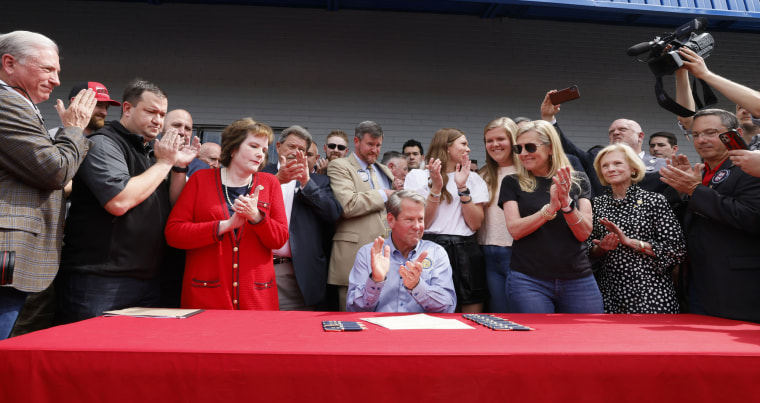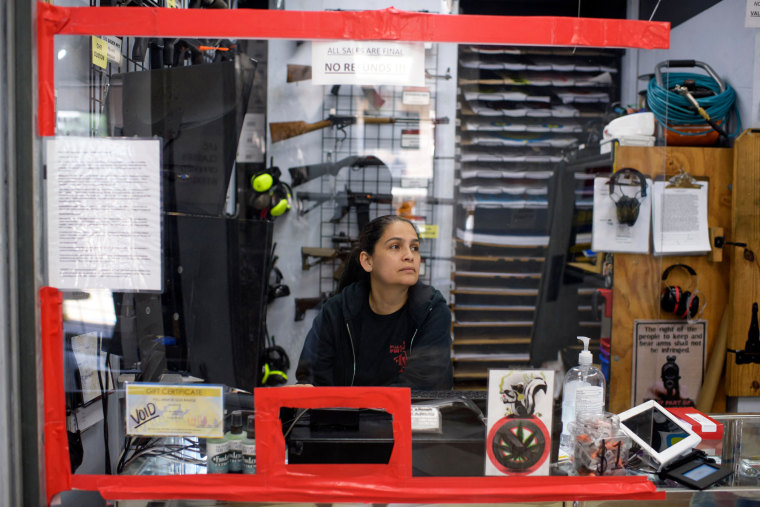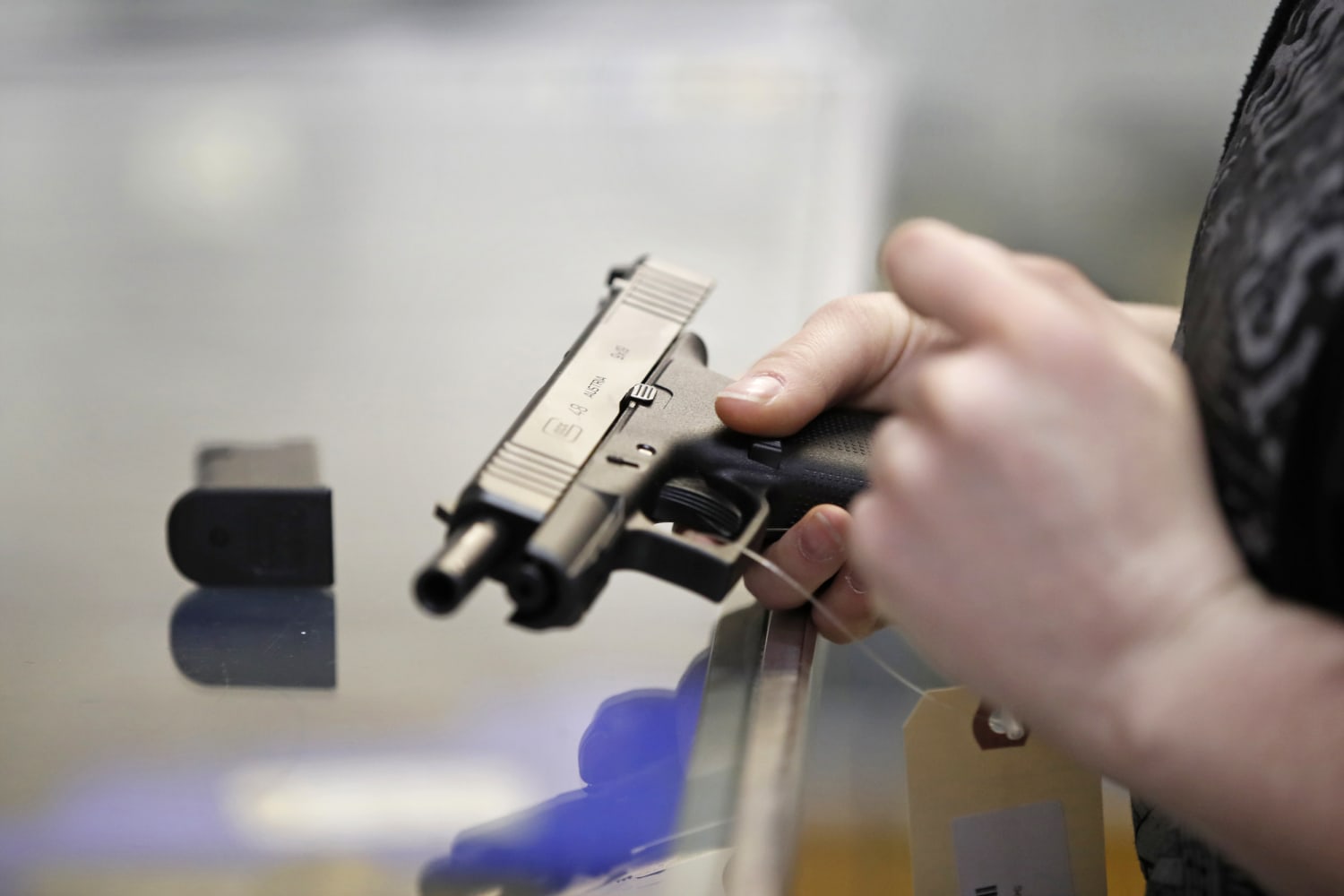Republican lawmakers across the country advanced dozens of gun-related bills this year to roll back firearm restrictions or challenge federal regulations — efforts that have come under scrutiny in light of recent mass shootings in Buffalo, New York, and Uvalde, Texas.
In particular, state legislators have focused efforts on passing legislation that would allow people to carry concealed weapons without a permit, sometimes called “constitutional carry” measures by their proponents. Lawmakers in seven states — Georgia, Alabama, Wisconsin, South Carolina, Indiana, Ohio and Nebraska — introduced such bills this year, and four enacted them.
Currently, 25 states allow people to carry concealed weapons without a permit, with more bills likely to pass in coming years — a trend that has worried those concerned about potential hikes in gun-related violence.
A 2021 Pew Research Center study reported that the number of Americans who support stricter gun laws has declined since 2019. But that same study also found that majorities in both parties oppose permitless carry legislation, with many worried that it would expand gun access to untrained and unvetted buyers.
In Texas, where an 18-year-old shot and killed at least 21 people at an elementary school earlier this week, Republicans enacted permitless carry in September 2021. The shooting raised questions about which, if any, of Texas’ lax gun restrictions could have contributed to Tuesday’s violence.
Republican state legislators have often coupled recent pushes for permitless carry with messaging about violent crime to galvanize support from pro-gun voters and energize their conservative base ahead of elections.
“Officials are responsive to motivated and passionate constituencies that are willing to make their voices heard, and there’s no doubt in America that the gun rights movement fits that description,” said Adam Winkler, a constitutional law professor at UCLA. “They’re looking for new, remaining restrictions to tear down, even if they’re not the ones the general public would support.”
Gun legislation became a talking point in Georgia for Republican Gov. Brian Kemp as he anticipated a gubernatorial primary against former U.S. Sen. David Perdue — a move Winkler said was unsurprising, as competitive primaries encourage hyperpartisan policies. Kemp endorsed permitless carry in January and signed it into law April 13, allowing legal gun owners to carry concealed handguns without a permit. Kemp easily won the GOP nomination last week.

Republican Gov. Mike DeWine of Ohio similarly removed permit requirements in March, raising concerns from law enforcement that officers would no longer know if someone possesses a weapon.
“Putting more gasoline on a fire doesn’t put the fire out, and that’s what they’re doing here,” said Michael Weinman, director of governmental affairs for Ohio’s Fraternal Order of Police, which represents around 24,000 officers. “If we put more guns on the street, you’re going to have people who don’t know what their rights and responsibilities are, and it just doesn’t help.”
Weinman said officers statewide believe the law will further endanger them amid increased homicide rates in cities. It could also encourage an “adversarial relationship” with communities that distrust the police, he said, damaging efforts to build ties with them.
Under this law, Weinman said, “things are just gonna be worse.”
Proposals continue yearslong deregulation trend
The number of bills expanding gun access isn’t surprising, said Matthew Lacombe, a political science professor at Barnard College who studies National Rifle Association influence in politics.
Republican legislators and the NRA have a lengthy relationship, Lacombe said, and recent deregulation continues a yearslong trend assisted by organized pushes from the NRA and high voter turnout among gun owners. NRA spokesperson Amy Hunter wrote to NBC News that the NRA began to push legislation to allow permitless carry in 2003.
While deregulation predates recent violent crime concerns, Winkler said it’s unsurprising that Republicans have jumped at any opportunity to justify the policy.
“Even though crime spikes are coming up from all-time lows, people are concerned, and while I don’t think a permitless carry system is likely to reduce crime … it’s going to be used to help justify any kind of policy related to self-defense or firearms,” Winkler said.
The Georgia bill’s sponsor, Republican state Sen. Jason Anavitarte, told NBC News that the legislation came in response to constituents who couldn’t obtain permits because of office closures during the pandemic, and feared crime.
Anavitarte asserted that Georgia background check requirements for federal firearms dealers would deter criminal activity. Private sellers, however, aren’t required to perform checks under Georgia law.
“The opposing argument will say that this is going to do more harm than good, but if you’re a criminal in Georgia, you shouldn’t be carrying anyway,” Anavitarte said. “As we’ve seen crime rates go up, I think more people want to be able to possess a firearm to protect themselves.”

With limited federal action, opponents worry bills could increase violence
Critics of the bills caution that permitless carry could actually lead to more crime, not less.
“Less checks means more guns, more violence, more deaths and more bloodshed. In eliminating this requirement, you’re basically saying we won’t have this check on these criminals, now that check will no longer exist,” said Georgia Sen. Elena Parent, a Democratic state lawmaker who opposes permitless carry.
Parent also said that Georgia’s changes could affect states with stricter laws. The University of Alabama at Birmingham analyzed firearm deaths over 18 years and found that “weaker firearm laws in neighboring states correlated with more firearm deaths within a state,” even if that state had strong gun regulations.
Daniel Webster, director of the John Hopkins Center for Gun Violence Prevention and Policy, said studies on permitless carry are ongoing, so it’s unclear how they’ll affect violence. However, he said, looser gun laws often increase firearm-related crimes.
“The most rigorous and recent studies are showing that states deregulating civilian gun carrying tends to elevate violent crime, particularly with guns,” Webster said, citing studies connecting concealed carry with increased homicides.
“The people who get permits or licenses to carry tend to be in a pretty law-abiding group, but what we’re finding is that as gun-carrying gets deregulated and more people are doing it, a lot more guns are being stolen, particularly from motor vehicles,” he added.
Everytown for Gun Safety, a nonprofit organization that advocates for gun restrictions, also linked gun restrictions and firearm-related deaths after analyzing every state. Mississippi, for example, had the weakest restrictions and highest number of deaths.
“Removing the permitting requirement will just make it easier for criminals and anyone with a dangerous history to carry hidden, loaded handguns in public. It will make it harder for law enforcement to identify them,” said Shannon Watts, founder of Everytown affiliate Moms Demand Action. “Why would lawmakers make it easier for criminals to access guns?”
President Joe Biden, meanwhile, has said that addressing gun violence is a legislative priority. His administration has rolled out proposals to combat the spread of firearms, including Justice Department rules to crack down on “ghost guns” and stabilizing braces, promoting “red flag” laws to take guns away from at-risk individuals and launching five nationwide firearms trafficking units.
“I’ll keep doing everything in my power to make sure that communities are safer, but Congress needs to do its part, too,” Biden said in February, citing a need for universal background checks and assault weapons bans.
Efforts in Congress to pass new gun safety measures, which had stalled for years following the 2012 Sandy Hook elementary school shooting, have gained new momentum after the Texas and New York attacks.
It’s unclear, however, if Biden and Congress will remain at an impasse over gun control as states reduce regulations or if recent events will spark long-awaited changes in federal gun control.
“Biden does not have a lot of capacity to affect gun violence,” Webster said. “What he’s able to do, certainly in the short term, is somewhat limited.”
Source: | This article originally belongs to Nbcnews.com










